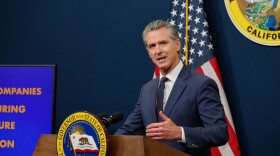Prime Minister Nouri al-Maliki said Saturday that the Iraqi army and police are capable of keeping security in the country when American troops leave "any time they want," though he acknowledged the forces need further weapons and training.
The embattled prime minister sought to show confidence at a time when congressional pressure is growing for a withdrawal and the Bush administration reported little progress had been made on the most vital of a series of political benchmarks it wants al-Maliki to carry out.
Al-Maliki said difficulty in enacting the measures was "natural" given Iraq's turmoil.
But one of his top aides, Hassan al-Suneid, rankled at the assessment, saying the U.S. was treating Iraq like "an experiment in an American laboratory." He sharply criticised the U.S. military, saying it was committing human rights violations, embarassing the Iraqi government with its tactics and cooperating with "gangs of killers" in its campaign against al-Qaida in Iraq.
Al-Suneid's comments were a rare show of frustration toward the Americans from within al-Maliki's inner circle as the prime minister struggles to overcome deep divisions between Shiite, Sunni and Kurdish members of his coalition and enact the American-drawn list of benchmarks.
In new violence in Baghdad on Saturday, a car bomb leveled a two-story apartment building, and a suicide bomber plowed his explosives-packed vehicle into a line of cars at a gas station. The two attacks killed at least eight people, police officials said on condition of anonymity because they were not authorize to release details of the attacks.
Thursday's White House assessment of progress on the benchmarks fueled calls among congressional critics of the Iraqi policy for a change in strategy, including a withdrawal of American forces.
Iraqi Foreign Minister Hoshyar Zebari warned earlier this week of civil war and the government's collapse if the Americans leave. But al-Maliki told reporters Saturday, "We say in full confidence that we are able, God willing, to take the responsibility completely in running the security file if the international forces withdraw at any time they want."
But he added that Iraqi forces are "still in need of more weapons and rehabilitation" to be ready in the case of a withdrawal.
On Friday, the Pentagon conceded that the Iraqi army has become more reliant on the U.S. military. The chairman of the Joint Chiefs of Staff, Gen. Peter Pace, said the number of Iraqi batallions able to operate on their own without U.S. support has dropped in recent months from 10 to six, though he said the fall was in part due to attrition from stepped-up offensives.
Al-Maliki told a Baghdad press conference that his government needs "time and effort" to enact the political reforms that Washington seeks - "particularly since the political process is facing security, economic and services pressures, as well as regional and international interference."
"These difficulties can be read as a big success, not negative points, when they are viewed under the shadow of the big challenges," he said.
In the White House strategy, beefed-up American forces have been waging intensified security crackdowns in Baghdad and areas to the north and south for nearly a month. The goal is to bring quiet to the capital while al-Maliki gives Sunni Arabs a greater role in the goverment and political process, lessening support for the insurgency.
But the benchmarks have been blocked by divisions among Shiite, Sunni and Kurdish leaders. In August, the parliament is taking a one month vacation - a shorter break than the usual two months, but still enough to anger some in Congress who say lawmakers should push through the measures.
Al-Suneid, a Shiite lawmaker close to al-Maliki, bristled at the pressure. He called Thursday's report "objective," but added, "this bothers us a lot that the situation looks as if it is an experiment in an American laboratory (judging) whether we succeed or fail."
He also told The Associated Press that al-Maliki has problems with the top U.S. commander Gen. David Petraeus, who works along a "purely American vision."
He criticized U.S. overtures to Sunni groups in Anbar and Diyala, encouraging former insurgents to join the fight against al-Qaida in Iraq. "These are gangs of killers," he said.
"There are disagreements that the strategy that Petraeus is following might succeed in confronting al-Qaida in the early period but it will leave Iraq an armed nation, an armed society and militias," said al-Suneid.
He said that the U.S. authorities have embarrassed al-Maliki' government through acts such as constructing a wall around Baghdad's Sunni neighborhood of Azamiyah and repeated raids on suspected Shiite militiamen in the capital's eastern slum of Sadr City. He said the U.S. use of airstrikes to hit suspected insurgent positions also kills civilians.
"This embarrasses the government in front of its people," he said, calling the civilian deaths a "human rights violation."
From The Associated Press
Copyright 2022 NPR. To see more, visit https://www.npr.org. 9(MDAzMjM2NDYzMDEyMzc1Njk5NjAxNzY3OQ001))





